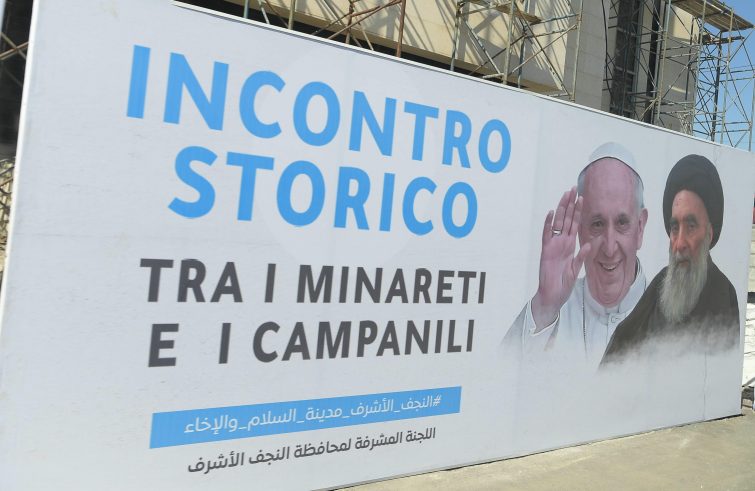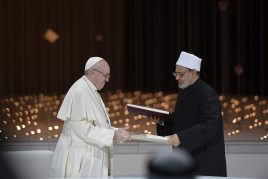
The Great Imam of al-Azhar Sheikh Ahmad Al-Tayyeb will visit Iraq, where he will meet all the high representatives of Iraqi society. It is expected that the visit may include a meeting with the Grand Ayatollah Ali al-Sistani. A date has not yet been fixed, but the news of the journey has been confirmed in statements to SIR by one of the leading Iraqi Shiite personalities, Sayyed Jawad Mohammed Taqi Al-Khoei, Secretary-General of the Al-Khoei Institute in Najaf and grandson of Grand Ayatollah Abu Al-Qasim Al-Khoei (1899-1992).
“Strengthening a path of openness.” Al-Tayyeb, “has expressed his strong desire to visit Iraq also to meet the Shiite religious leaders”, the Patriarch of Chaldean Catholics in Baghdad, Card. Louis Raphael Sako, told SIR.
“I believe that this visit is a fruit of Pope Francis’ visit to Iraq last March.
During that visit the Holy Father had a meeting with the Grand Ayatollah al-Sistani, one of Shiite Islam’s most authoritative figures, in the Holy City of Najaf. The visit to Iraq could therefore provide an opportunity for the two Islamic leaders, Sunni cleric Sheikh Ahmed al-Tayyeb and Shiite Ayatollah al-Sistani, to meet and dialogue, thereby consolidating the path paved by the Abu Dhabi Document on Human Fraternity. This means disseminating and making this text known in their schools and in the media. The Abu Dhabi Document is the bedrock for a future of peaceful coexistence between different faiths and peoples”, the Cardinal said.
“I am sure that Al-Tayyeb’s visit to Iraq will foster coexistence not only between Muslims but also between Muslims and Christians and between members of other faiths,” the Patriarch remarked. “If Shiites and Sunnis live in peace, we too will live in peace”.
 For the Cardinal, as denounced on previous occasions, the key issue remains “overcoming a sectarian mentality that prevents the recognition of our fellow other as a citizen in his own right, as a brother to be respected and not marginalised by stripping him of his individual rights. We need to form consciences on these grounds. In this respect, religions have a role to play in composing this mosaic of fraternity and living together. I hope that Al-Tayyeb’s visit to Iraq and to al-Sistani will broaden and consolidate the path paved in Abu Dhabi”.
For the Cardinal, as denounced on previous occasions, the key issue remains “overcoming a sectarian mentality that prevents the recognition of our fellow other as a citizen in his own right, as a brother to be respected and not marginalised by stripping him of his individual rights. We need to form consciences on these grounds. In this respect, religions have a role to play in composing this mosaic of fraternity and living together. I hope that Al-Tayyeb’s visit to Iraq and to al-Sistani will broaden and consolidate the path paved in Abu Dhabi”.
Elections in Iraq. Iraq will hold a parliamentary election next October 10. “It is an important vote, required to guarantee a stable government for the country, capable of ensuring a solid and safe future for the people” the Patriarch said. He pointed out:
“The ground was not sufficiently prepared. Instability and corruption are rife; there are armed militias in the streets and plenty of money goes into buying votes. A vote is paid up to $100 or more.”
Vote-buying, tampering and fraud concerns were echoed by the Iraqi Independent High Electoral Commission, which reported election fraud attempts to local media. “We are witnessing major disputes among Islamist- as well as other -political parties to stay in power. The question is: what could happen if they lose the elections? Will there be an outbreak of violence and turmoil in political life? What should we expect?” The Cardinal’s concerns are partially answered by national authorities: “We understand that the government is aware of the situation and will do its utmost to ensure the regularity of the vote”, His Eminence added. “However, it is a fact that Iraq is a vast country and many locations are hard to reach, even for those tasked with monitoring the situation.”
 Christians to the polls. The Christian minority will cast a fragmented vote. The Cardinal’s invitation to form a single list of five candidates – the number of candidates entitled to the Christian minority according to the current quotas – has not been embraced. There are 35 Christian candidates running for 325 parliament seats, spread over more than 40 coalitions comprising 267 parties. Out of approximately 3500 candidates, just over a thousand are members of parties and coalitions. “Because of this,” Mar Sako explained, “they will not be able to represent Christian issues as they could have had they been elected within a Christian electoral list. The five seats reserved for Christians will thus be seized by stronger parties.” That is why there is a high risk that Christians will not vote. “As a Church we made an appeal to vote, but the people are clearly discouraged,” the Cardinal concluded. In 2018, the turnout was only 44%.
Christians to the polls. The Christian minority will cast a fragmented vote. The Cardinal’s invitation to form a single list of five candidates – the number of candidates entitled to the Christian minority according to the current quotas – has not been embraced. There are 35 Christian candidates running for 325 parliament seats, spread over more than 40 coalitions comprising 267 parties. Out of approximately 3500 candidates, just over a thousand are members of parties and coalitions. “Because of this,” Mar Sako explained, “they will not be able to represent Christian issues as they could have had they been elected within a Christian electoral list. The five seats reserved for Christians will thus be seized by stronger parties.” That is why there is a high risk that Christians will not vote. “As a Church we made an appeal to vote, but the people are clearly discouraged,” the Cardinal concluded. In 2018, the turnout was only 44%.












